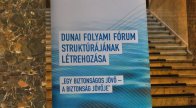A 2013 nyarán indult DARIF (Dunai Folyami Fórum struktúrájának létrehozása) című projekt megvalósítása során áprilisban megrendezésre került az Első Közös Művelet (továbbiakban: művelet), majd május közepén az Extra Szakértői Munkacsoporti Ülésen annak értékelését is megtartották. A műveletet április 7-11-e között hajtották végre a Mohács Határkikötőben felállított ideiglenes koordinációs központból irányítva, a DARIF-ban résztvevő tíz ország illetve a Frontex, az Europol és az EUBAM képviselői közös részvételével. A Budapesten, a Belügyminisztériumban május 13-14-én megrendezésre került Extra Szakértői Munkacsoporti Ülésen (továbbiakban: ülés) a tagországok hetven szakértője együttesen összegezte az Első Közös Művelet eredményeit, tapasztalatait, majd megvitatták annak tanulságait és irányt szabtak az idén júliusban, illetve novemberben esedékes Második és Harmadik Közös Műveletnek.
Az Első Közös Művelet lebonyolításához minden tagállamból egy-egy nemzeti összekötő tiszt érkezett Mohácsra, akik elsősorban az információáramlás folyamatos biztosításáról gondoskodtak, de felelősek voltak a saját nemzeti műveleti tervük végrehajtásáért, a tagállami kapcsolattartási pontok és az ideiglenes koordinációs központ közötti napi kapcsolattartásért, valamint az egymás közötti kölcsönös segítségnyújtásért is. A nemzeti tervek az országok saját igényein, kockázatelemzésein, bevonható forrásain és választott céljain alapultak.
A művelet során, az ellenőrzések kiterjedtek a Duna egész szakaszára és partvonalára, ugyanakkor nem érintették a Duna–Majna–Rajna-csatornát. A hatóságok leginkább az illegális migrációra, az emberkereskedelemre, a drog- és cigarettacsempészetre, az okmányhamisításra és a körözött személyek elfogására fókuszáltak. A műveletben a tagországok részéről összesen 653 szolgálati személy vett részt, naponta 25-30 szolgálati hajóval és ugyanennyi gépjárművel. A három műveleti nap alatt 770 átvizsgálás történt a vízi járműveken és a kikötőkben; a tíz országban együttvéve 10 147 személyt és dokumentumot vizsgáltak át a hatóságok.
A résztvevők egyöntetűen sikeresnek nevezték a műveletet és megkezdték a felkészülést a júliusi Második Közös Műveletre, mely során a nyári turista szezon miatt jóval nagyobb hajóforgalomra számítanak.
A művelet lezárását és az előzetes eredmények értékelését követően májusban került sor az újabb szakértői ülésre, amelyen a szakértők – a decemberihez hasonlóan – közösen és munkacsoporti szinten is (bűnügyi kockázatelemzés, vámügy, határrendészet, vízi közlekedés, veszélyesáru-szállítás és információcsere) tanácskoztak: megvitatták az eddigi eredményeket és új ötletekkel gazdagították a projekt szakmai tartalmát. A plenáris előadáson az Europol és a Duna Stratégia 1a Prioritási Területének (belvízi hajózás) képviselői előadása mellett a tagállamok összekötő tisztjei is ismertették a művelet során szerzett tapasztalataikat. A munkacsoport koordinátorok hamarosan elkészítik a szakértői munkacsoportok emlékeztetőit és megküldik a nemzeti delegáltaknak. Az ülés zárásaként Herczeg Mónika rendőr alezredes asszony, a DARIF projekt menedzsere búcsúzott a résztvevőktől, megköszönte munkájukat és biztosította őket arról, hogy a szoros együttműködést a jövőben is fenntartják.
A rendezvényen elhangzott előadások a kapcsolódó anyagok közül tölthetők le.
The 1st Joint Operation and the Extra Workshop of the DARIF – the international law enforcement cooperation has reached its midterm
In the DARIF project (Setting up the Structure of a Danube River Forum, launched in 2013) two important events were organized in the first half of 2014. The 1st Joint Operation (hereinafter: operation) was implemented 7-11 April and was coordinated from the Temporary Coordination Centre in the Border Port of Mohács with the involvement of liaison officers from the ten member states of the DARIF as well as the Frontex, Europol and EUBAM. The Extra Workshop (hereinafter: workshop) was held in the Ministry of Interior of Hungary in Budapest 13-14 May which gave approximately 70 experts from the member states of the DARIF the opportunity to summarize and evaluate the results, experiences and findings of the operation and to set a direction for the 2nd and 3rd Joint Operations that are due in July and November 2014.
All the ten member states sent one liaison officer to Mohács for the operation; they were responsible first of all for maintaining the constant flow of information, for the implementation of their national operational plans, for the daily contact between the Temporary Coordination Centre and their national contact points and also for the mutual assistance among them. The national operational plans were based on the needs, demands, risk analyses, available resources and chosen objectives of each country.
Controls covered the whole length of the Danube and its banks, but did not include the Rhine–Main–Danube Canal. Authorities focused mostly on illegal migration, trafficking in human beings, smuggling of cigarettes, tobacco products and drugs, document forgery and apprehension of wanted persons. During the operation 653 officers were involved in the ten member states as well as 25-30 duty boats and cars per day. 770 searches were carried out in passenger cruise ships, tugboats, freight ships, containers, cars and destination ports. Authorities controlled altogether 10 147 persons and documents.
Participants unanimously regarded the operation as a successful event and they started the preparations for the 2nd Joint Operation during which probably much bigger traffic will be on the Danube because of the tourist season.
After the operation and the evaluation of the preliminary results the project team started to organize an Extra Workshop in May in order to provide the experts from the ten member states an opportunity – just as it happened in December 2013 – to discuss the outcomes and results so far and come up with new ideas in plenary as well as expert group sessions (criminal risk analysis, customs, border management, water transportation and transportation of dangerous goods as well as information exchange). At the plenary session of the workshop presentations were held by the representatives of the Europol, the Priority Area 1a (mobility and multimodality of inland waterways) of the European Union Strategy for the Danube Region and the liaison officers of the 1st Joint Operations. The expert group coordinators will soon send the participants the minutes of the parallel thematic workshops. Ms Mónika Herczeg police lieutenant colonel, the project manager of the DARIF closed the workshop, expressed her gratitude to the participating experts and ensured them to maintain the already close cooperation in the future.
The presentations of the project can be found under 'related files' (kapcsolódó anyagok).

